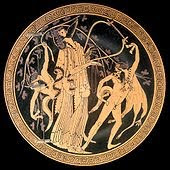

Odysseus (Greek: Ὀδυσσεύς, Odusseus) or Ulysses (Latin: Ulyssēs, Ulixēs) was a legendary Greek king of Ithaca and the hero of Homer's epic poem the Odyssey.
Odysseus also plays a key role in Homer's Iliad and other works in the Epic Cycle. King of Ithaca, husband of Penelope, father of Telemachus, and son of Laërtes and Anticlea, Odysseus is renowned for his guile and resourcefulness, and is hence known by the epithet Odysseus the Cunning (mētis, or "cunning intelligence"). He is most famous for the ten eventful years he took to return home after the ten-year Trojan War and his famous Trojan Horse trick.
"Cruel Odysseus"
Homer's Iliad and Odyssey portrayed Odysseus as a culture hero, but the Romans, who believed themselves the scions of Prince Aeneas of Troy, considered him a villainous falsifier. In Virgil's Aeneid, he is constantly referred to as "cruel Odysseus" (Latin "dirus Ulixes") or "deceitful Odysseus" ("pellacis", "fandi fictor").
Turnus, in Aeneid ix, reproaches the Trojan Ascanius with images of rugged, forthright Latin virtues, declaring (in John Dryden's translation), "You shall not find the sons of Atreus here, nor need the frauds of sly Ulysses fear." While the Greeks admired his cunning and deceit, these qualities did not recommend themselves to the Romans who possessed a rigid sense of honour. In Euripides's tragedy Iphigenia at Aulis, having convinced Agamemnon to consent to the sacrifice of his daughter, Iphigenia, to appease the goddess Artemis, Odysseus facilitates the immolation by telling her mother, Clytemnestra, that the girl is to be wed to Achilles. His attempts to avoid his sacred oath to defend Menelaus and Helen offended Roman notions of duty; the many stratagems and tricks that he employed to get his way offended Roman notions of honour.
Before the Trojan War
The majority of sources for Odysseus' antebellum exploits—principally the mythographers Apollodorus and Hyginus—postdate Homer by many centuries.
Two stories in particular are well known: When Helen was abducted, Menelaus called upon the other suitors to honour their oaths and help him to retrieve her, an attempt that would lead to the Trojan War. Odysseus tried to avoid it by feigning lunacy, as an oracle had prophesied a long-delayed return home for him if he went. He hooked a donkey and an ox to his plough (as they have different stride lengths, hindering the efficiency of the plough) and (some modern sources add) started sowing his fields with salt.
Palamedes, at the behest of Menelaus's brother Agamemnon, sought to disprove Odysseus's madness, and placed Telemachus, Odysseus's infant son, in front of the plough. Odysseus veered the plough away from his son, thus exposing his stratagem. Odysseus held a grudge against Palamedes during the war for dragging him away from his home. Odysseus and other envoys of Agamemnon then traveled to Scyros to recruit Achilles because of a prophecy that Troy could not be taken without him.
By most accounts, Thetis, Achilles's mother, disguised the youth as a woman to hide him from the recruiters because an oracle had predicted that Achilles would either live a long, uneventful life or achieve everlasting glory while dying young. Odysseus cleverly discovered which of the women before him was Achilles when the youth stepped forward to examine an array of weapons. Odysseus arranged for the sounding of a battle horn, which prompted Achilles to clutch a weapon; with his disguise foiled, he joined Agamemnon's army.
During the Trojan War
The Iliad
Odysseus was one of the most influential Greek champions during the Trojan War. Along with Nestor and Idomeneus he was one of the most trusted counsellors and advisers. He always championed the Achaean cause, especially when the king was in question, as in one instance when Thersites spoke against him.
When Agamemnon, to test the morale of the Achaeans, announced his intentions to depart Troy, Odysseus restored order to the Greek camp. Later on, after many of the heroes had left the battlefield due to injuries (including Odysseus and Agamemnon), Odysseus once again persuaded Agamemnon not to withdraw. Along with two other envoys, he was chosen in the failed embassy to try to persuade Achilles to return to combat.
When Hector proposed a single combat duel, Odysseus was one of the Danaans who reluctantly volunteered to battle him. Telamonian Ajax, however, was the volunteer who eventually did fight Hector. Odysseus aided Diomedes during the successful night operations in order to kill Rhesus, because it had been foretold that if his horses drank from the Scamander river Troy could not be taken.
After Patroclus had been slain, it was Odysseus who counselled Achilles to let the Achaean men eat and rest rather than follow his rage-driven desire to go back on the offensive—and kill Trojans—immediately. Eventually (and reluctantly), he consented. During the funeral games for Patroclus, Odysseus became involved in a wrestling match with Telamonian Ajax, as well as a foot race. With the help of the goddess Athena, who favoured him, and despite Apollo's helping another of the competitors, he won the race and managed to draw the wrestling match, to the surprise of all. Odysseus has traditionally been viewed in the Iliad as Achilles's antithesis: while Achilles's anger is all-consuming and of a self-destructive nature, Odysseus is frequently viewed as a man of the mean, renowned for his self-restraint and diplomatic skills. He is more conventionally viewed as the antithesis of Telamonian Ajax (Shakespeare's "beef-witted" Ajax) because the latter has only brawn to recommend him, while Odysseus is not only ingenious (as evidenced by his idea for the Trojan Horse), but an eloquent speaker, a skill perhaps best demonstrated in the embassy to Achilles in book 9 of the Iliad. And the pair are not only foils in the abstract but often opposed in practice; they have many duels and run-ins.


More pics.....2-3 would be nice
OdgovoriIzbrišicheers !